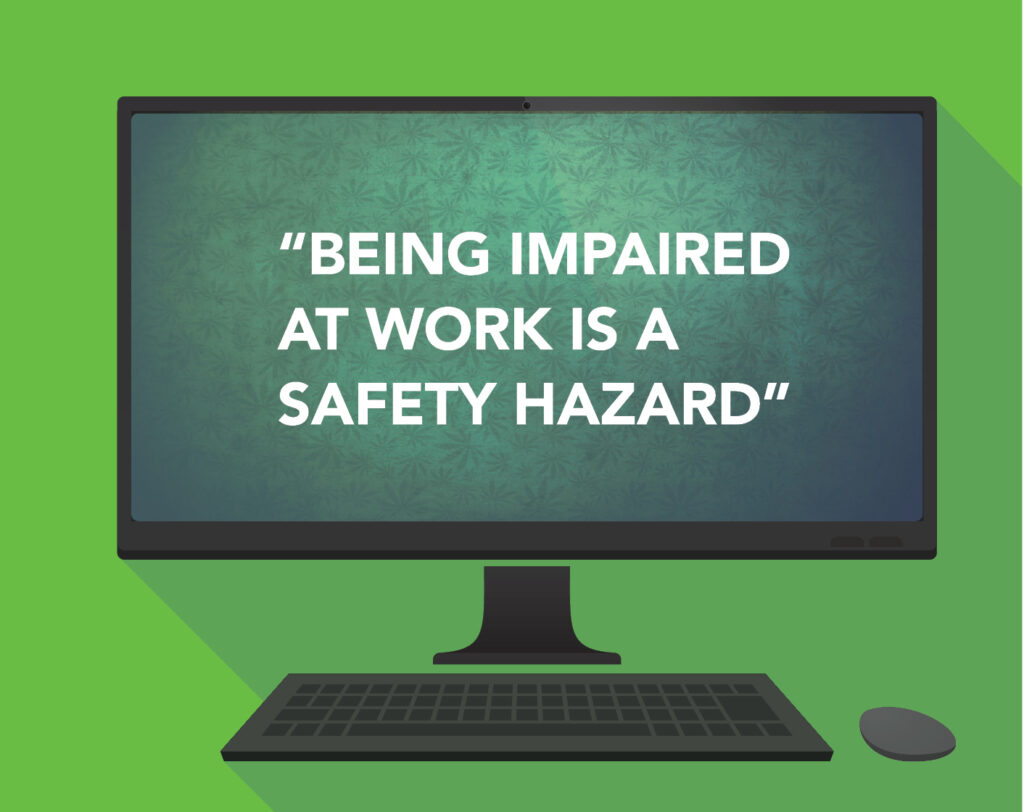Cannabis in the Workplace

Are you fit it work?
On Oct. 17, the Cannabis Act came into law which legalized cannabis for recreational use in Canada. If you are wondering if cannabis legalization changes your role and responsibilities in terms of workplace safety, the bottom line is that it doesn’t.
The Act gives adults access to legal cannabis, but this does not mean that you can show up to work under the influence. Whether you are an employer or a worker, the question ultimately remains the same: are you fit to work?
Being impaired at work is a safety hazard, and as with any workplace hazard, employers must identify, assess, and control it. Employers have a duty to make sure a worker does not perform any task that they cannot do safely and a duty to protect all workers from a potential workplace incident.
Cannabis isn’t the only reason a worker could be impaired and not be able to perform their tasks safely. Impairment can come from fatigue, stress, illness, or the use of alcohol, drugs, prescribed and over-the-counter medication. But keep in mind that the effects of cannabis may differ from other known substances – and do differ from person to person. Ingesting or smoking cannabis has short-term effects that influence a person’s mental and physical abilities. While the short-term effects of using cannabis will vary, the fact remains that if a worker can’t perform their job safely, they are putting not only their own safety at risk, but the safety of everyone at the workplace. Depending on the source of impairment, it may feel awkward, but, workers have a legal duty to tell their employer of any known physical or mental impairments that may affect their ability to perform a task safely. And employers can’t let workers perform tasks if they suspect the worker is impaired.
Most workplaces already have drug and alcohol policies that prohibit the use of restricted substances while on the job and require employees to be fit for work when on duty. Employers across the country are developing their drug and alcohol policies to include impairment due to cannabis. If you’re unsure of what the rules are around cannabis at your workplace, now is a good time to discuss what the rules are.
If your workplace doesn’t have a policy on impairment, the Workers’ Safety and Compensation Commission (WSCC) of the Northwest Territories and Nunavut has information and educational materials for employers and workers to help. Safety bulletins which focus on different sources of impairment are available, along with a code of practice on cannabis, on WSCC’s website. Safety bulletins are short, printable handouts no more than one or two pages long, that you can use at workplace safety briefings or display in common areas in the workplace. Codes of practice provide practical, step-by-step guidance on certain topics to help employers and workers understand and meet safety standards required by safety legislation across the Northwest Territories and Nunavut. The Cannabis code of Practice includes a sample impairment policy which employers can adapt for their own use. (Visit www.wscc.nt.ca/impairment or www.wscc.nu.ca/impairment for these safety resources and more.)
When it comes to the workplace safety responsibilities of employers and workers, the legalization of recreational cannabis does not change the fact that we must all make sure we are “fit for work”, and always able to perform work safely. Safety is everyone’s responsibility. That means if you see something unsafe or someone working without using safety precautions, you must do (or say) something. Remove the hazard if it is safe for you to do so, stop the person who is working unsafely, or report it to your supervisor. After all, working safely gets you home safe and sound, which is always worth it.

